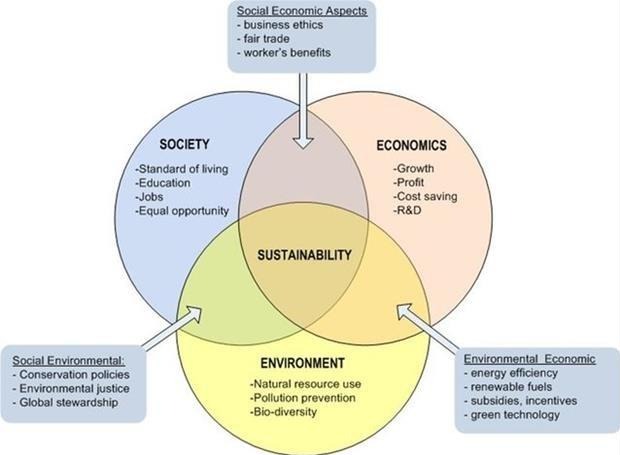Before I delve deeper into the various aspects of my major research topic of sustainability, it is important to first clearly define the term.
Etymologically speaking, the word „sustainable“ is a compound of „sustain“ + „able“. „To sustain“ means „to support“, „to maintain“ or „to bear“.
„Sustainable“ therefore is an adjective for something that can be sustained, i.e. something that is „bearable“ and „can be continued at a certain level“. So essentially, sustainability can be seen as a process by which something is maintained at a certain level (1).
Whilst the composition of the word already provides information about the meaning of it, it is also useful to take a closer look at its definition.
I noticed, that people often have too narrow a definition of the term sustainability. Whilst the environmental part of it is usually immediately associated with the topic, the Brundtland report of the world commission on environment and development from 1987 emphasizes that sustainability is a multifaceted concept that, in addition to environmental considerations, also encompasses social and economic concerns (2).
Figure 1 clearly shows the relationships between these three sectors.

In the Brundtland report it is stated that „sustainable development is development that meets the needs of the present without compromising the ability of future generations to meet their own needs“ (p.41) (2). This still remains the commonly agreed on definition of sustainable development.
The report also notes that „environmental and economic problems are linked to many social and political factors“ and that „new approaches must involve programs of social development, particularly to improve the position of women in society, to protect vulnerable groups, and to promote local participation in decision making“ (p. 37) (2).
Overall it is important to note that in recent times, due to global environmental and social challenges, the term „sustainability“ is often used in a way where it primarily refers to practices and measures taken to prevent the depletion of natural resources, so an ecological balance is uphold, ensuring that the quality of life isn’t compromised.
This understanding of sustainability encompasses various facets:
- preventing overexploitation of resources,
- optimizing manufacturing processes to reduce energy consumption and pollution,
- reevaluating product consumption patterns,
- influencing investment strategies,
- modifying citizen lifestyles,
- shaping consumer habits,
- advancing technology
- and implementing changes in business and institutional frameworks.
Actions are considered sustainable when they minimize or avoid harming the natural environment, driven by the belief that safeguarding ecosystems will secure the quality of life for present-day societies (1).
References
(1) youmatter. Sustainability – What Is It? Definition, Principles and Examples. https://youmatter.world/en/definition/definitions-sustainability-definition-examples-principles/
(2) World Commission on Environment and Development. (1987) Report of the World Commission on Environment and Development: Our Common Future. http://www.un-documents.net/our-common-future.pdf
(3) Prokopowicz D. (2020). IMPLEMENTATION OF THE PRINCIPLES OF SUSTAINABLE ECONOMY DEVELOPMENT AS A KEY ELEMENT OF THE PRO-ECOLOGICAL TRANSFORMATION OF THE ECONOMY TOWARDS GREEN ECONOMY AND CIRCULAR ECONOMY.DOI: 10.5604/01.3001.0014.3558